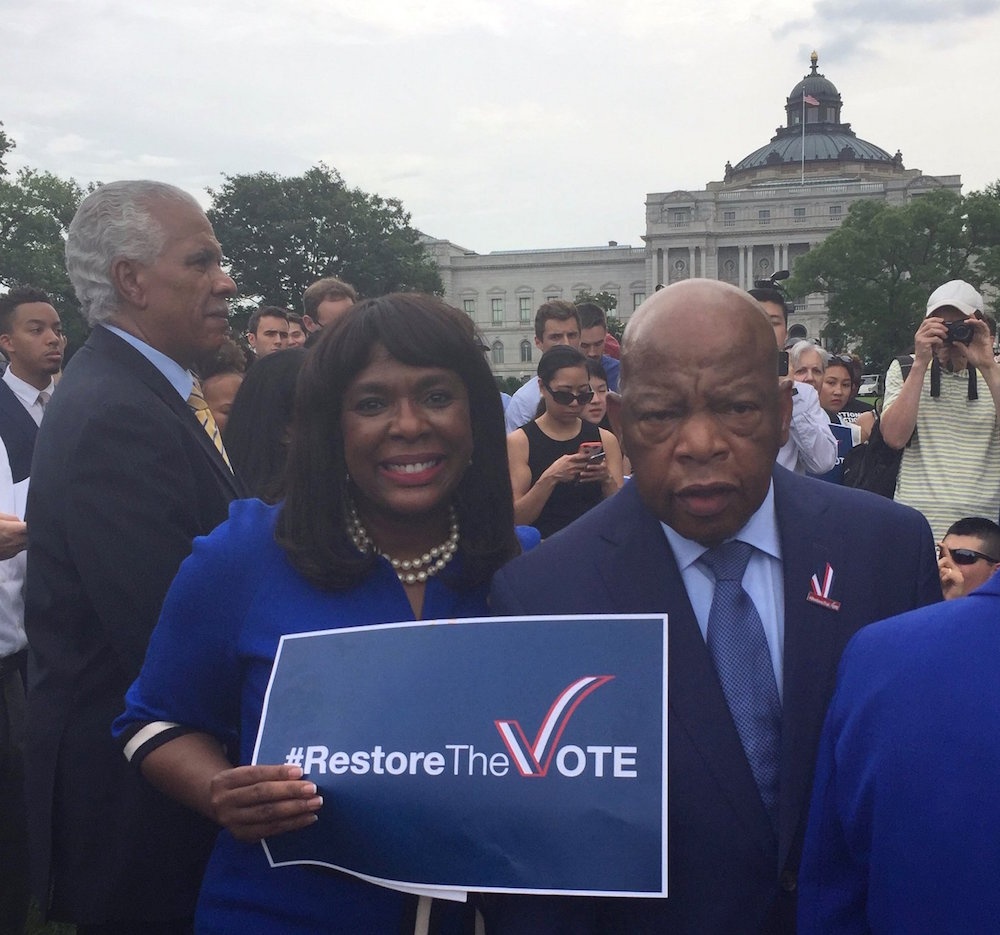Will Congress summon its courage and restore the Voting Rights Act?

U.S. Reps. Terry Sewell of Alabama and John Lewis of Georgia spoke at a recent press conference calling for passage of Sewell's bill to restore the Voting Rights Act, which would require political courage from the Republican-controlled Congress. (Photo from Sewell's Twitter account.)
As the nation approaches Independence Day, many will reflect on Frederick Douglass's 1852 speech, "What to the Slave is the 4th of July" — a text that calls out the United States for the hypocrisy of celebrating freedom from Britain while holding millions of Black people in bondage.
"With brave men," Douglass said, "there is always a remedy for oppression."
At the time Douglass delivered his speech, white Americans were marking the nation's 76th anniversary. But most Black Americans were enslaved, and all lived under the threat of the Fugitive Slave Law that denied their basic human rights and even their very humanity. Nevertheless, enslaved Blacks courageously continued to risk their lives to escape their oppression, and they were aided by abolitionists who bravely defied the immoral law by helping them escape to Canada.
A decade after Douglass's speech criticized a nation that professed to be built on tenets of freedom and equality while enslaving an entire group of people, hundreds of thousands would die in a bloody quest to end slavery. Among the casualties of the American Civil War were escaped slaves who chose to risk their lives fighting for freedom. For them, taking up arms was the remedy to their oppression.
Five years after the Civil War ended, the U.S. extended the right to vote to Black men, who braved the threat of white-supremacist vigilante violence to cast ballots — violence like Louisiana's Colfax Massacre of 1873, when white-supremacist Democrats killed at least 50 Blacks over a disputed gubernatorial election, or the 1874 Election Day massacre in Barbour County, Alabama, in which a white-supremacist paramilitary group killed seven Blacks attempting to vote and wounded at least 70 others.
The dauntlessness of the individuals who risked their lives to cast ballots under these conditions helped elect an estimated 2,000 Black men to serve in government at the local, state and federal levels.
As Blacks continued to exercise their power despite the threats, some whites gave in to political cowardice. For instance, to settle the disputed presidential election of 1876, Republican Rutherford B. Hayes cut a deal with white-supremacist Democrats. In exchange for their political support, Hayes — who claimed to believe in equal treatment without regard to race — agreed to end Reconstruction and to stop enforcing civil rights protections for African Americans. Though Hayes undoubtedly knew the devastating effect the deal would have on Blacks in the South, he still caved in to political pressure and ushered in an era of intense racial oppression.
For nearly 100 years, poll taxes, literacy tests, and discrimination tactics stripped Blacks of their political power. Many were killed for merely attempting to vote. But the bravery of voting rights activists who were viciously beaten by mounted, club-wielding Alabama state troopers as they marched across the Edmund Pettus Bridge in Selma, Alabama, on Bloody Sunday in March 1965 moved President Lyndon B. Johnson to send the Voting Rights Act (VRA) to Congress.
Doing so took political bravery on his part. Johnson knew he risked losing the support of Southern congressmen when he introduced the legislation, but he felt it was imperative to protect the basic rights of African Americans.
Passed on Aug. 6, 1965, the VRA was one of the most important accomplishments of the civil rights movement. It built on the 15th Amendment that granted African Americans the right to vote by setting up a mechanism to protect that right: a preclearance system requiring states with histories of voter discrimination to get federal approval before implementing new voting laws.
This week marks four years since the U.S. Supreme Court, in a case out of Alabama, struck down the VRA's preclearance clause in a 5-4 decision. In its wake, African Americans have been targeted by voter ID laws that disproportionately target them with surgical precision, racial gerrymandering that dilutes the power of their vote, and mass poll closures that make it harder for Blacks to access the ballot. Many of these threats have been initiated by Republicans who — like the Democrats of the Reconstruction era — fear the power of the Black vote.
One wonders if it's that fear that has led the chair of the House Judiciary Committee — Republican Rep. Bob Goodlatte of Virginia — to refuse even to hold a hearing for legislation that would restore the VRA by reestablishing the preclearance clause for states that have violated voting rights in the past 25 years. The Voting Rights Advancement Act (VRAA) was initially introduced in 2015 by Rep. Terri Sewell, an Alabama Democrat, and reintroduced in this Congress on June 21.
Although 185 of the 193 House Democrats have signed on to the legislation, no Republicans have done so. Perhaps they fear the power of a truly protected electorate?
At a June 22 press conference to promote the VRAA, Sewell was joined by Rep. John Lewis, the Georgia Democrat who still bears the scars of the fractured skull he sustained on Bloody Sunday as he led the voting rights march across that bridge in Selma. Lewis, whose life has exemplified Douglass's words about brave men, urged action on the bill.
"The vote is sacred in a democratic society like ours. From the time we are born until we die, it controls everything we do," Lewis said. "Some of us gave a little blood and spent time in jail. Many, still, died for the opportunity to vote. For that reason, it should be as easy as getting a clean glass of water."
Tags
Rebekah Barber
Rebekah is a research associate at the Institute for Southern Studies and writer for Facing South.
